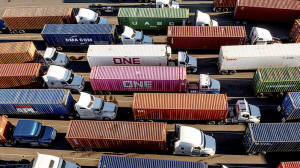Trump pauses tariffs on millions of low-value packages from China
 Send a link to a friend
Send a link to a friend
 [February 08, 2025] By
DIDI TANG and HALELUYA HADERO [February 08, 2025] By
DIDI TANG and HALELUYA HADERO
WASHINGTON (AP) — President Donald Trump has paused imposing tariffs on
small-value packages arriving from China, apparently to give federal
agencies time to sort out how to process millions of such shipments that
have come through the U.S. border every day without paying taxes.
The executive order, dated Wednesday, didn't say when the pause would
end but said it would cease when the Department of Commerce could put in
place “adequate systems” to “fully and expediently process and collect
tariff revenue.”
“It's just showing we're moving fast, and the implications are not fully
understood when some of these regulations are put in place,” said John
Lash, group vice president of product strategy at the supply chain
platform e2open, pointing out that Trump's order affected huge numbers
of small packages, many in transit.
“The volumes are absolutely incredible,” Lash said. “And all of a
sudden, they go from not requiring filing (for tariffs) ... to actually
requiring full filing, which is a complicated task.”
Ending tariff exemptions on low-cost packages from China has broad
bipartisan support in Washington, and Trump pulled the plug when he
raised tariffs on Chinese goods by 10% earlier this week. Goods sent
through duty-free packages became subject not only to existing tariffs —
25% for many Chinese products — but also the new 10%.
It marks another pause on Trump’s policies weeks into his second
administration, including orders to impose tariffs on Mexico and Canada
that were suspended after the two allies took steps to appease his
concerns about border security and drug trafficking.
The U.S. Postal Service, which would be burdened with collecting tariffs
on small packages, on Tuesday announced it would not accept parcels from
mainland China and Hong Kong, only to reverse the decision the next day.
It said it would work with Customs and Border Protection to implement a
collection process for the new tariffs.
“It's one of those things where you put in any change so quickly it
catches people unprepared,” Lash said.
Introduced in 1938, the so-called de minimis exception was intended to
facilitate the flow of small packages valued at no more than $5, the
equivalent of about $106 today. The threshold increased to $200 in 1994
and $800 in 2016. But the rapid rise of cross-border e-commerce, driven
by China, has challenged the intent of the decades-old customs exception
rule.

[to top of second column] |

Trucks line up to enter a Port of Oakland shipping terminal on Nov.
10, 2021, in Oakland, Calif. (AP Photo/Noah Berger, File)
 Chinese exports of low-value
packages soared to $66 billion in 2023, up from $5.3 billion in
2018, according to a report released last week by the Congressional
Research Service. And the U.S. market has been a major destination.
In 2023, for the first time, more than 1 billion such packages came
through U.S. customs, up from 134 million in 2015. By the end of
last year, Customs and Border Protection said it was processing
about 4 million small shipments a day, many of which came from China
through online retail platforms such as Shein and Temu.
Critics said the practice had allowed not only tariff evasion, but
also the flow of unsafe products such as counterfeits and illicit
drugs into the U.S. Supporters argued that it helped keep prices
affordable for U.S. consumers and small businesses.

After Trump threw out the exemption, some analysts noted that the
policy shift could lead to higher prices and delivery delays as U.S.
customs officials cope with an onslaught of packages to scrutinize.
“We are talking about millions of packages every week that currently
just basically get treated like domestic shipping,” said Neil
Saunders, a managing director with research firm GlobalData.
He said Temu has already adjusted by increasing its warehousing
capabilities in the U.S. during the past year and shipping products
in containers.
Lash said the end to the de minimis exception rule would change the
cross-border e-commerce model when tariffs and filing paperwork
drive up costs, prompting overseas sellers to turn to bulk shipping.
___
Hadero reported from South Bend, Indiana.
All contents © copyright 2025 Associated Press. All rights reserved |